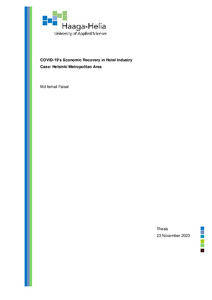COVID-19’s Economic Recovery in Hotel Industry: case: Helsinki Metropolitan Area
Faisal, Md. Ismail (2023)
Faisal, Md. Ismail
2023
All rights reserved. This publication is copyrighted. You may download, display and print it for Your own personal use. Commercial use is prohibited.
Julkaisun pysyvä osoite on
https://urn.fi/URN:NBN:fi:amk-2023112832241
https://urn.fi/URN:NBN:fi:amk-2023112832241
Tiivistelmä
COVID-19 has impacted every industry, but the hotel sector has been particularly badly struck. Hotels limit or shut their operations to slow down the spread of the pandemic virus. Limited business activities affect gradually and create a waterfall economic effect in the hotel business. In this research, the key interest was to find out the world economic impact of the COVID-19 pandemic both globally and locally, theories on economic recovery, and managerial implications to mitigate the crisis. This study is being conducted as qualitative research utilizing the case study as the research method.
It has been found that the Year 2020 is the worst year of the world's hotel occupancy rate record in number for hotel occupancy. In Europe, in 2020, a loss of a turnover of 115b€ was recorded. Only 43% of jobs were lost in North America in March and April 2020. In accounts for 48%, RevPAR declined in the same year. Asia has found a drop of 57% in occupancy and 63.4 million tourism job losses during the topmost hit by COVID-19. Africa, the world's second-fastest-growing tourism industry, faced a sudden halt after the COVID-19 attack. Tourism has always depended on international travellers. Only Ghana, in the year 2019, has received $1.9 billion from tourism, which accounts for 5.5% of GDP in the West African nation. One-fifth of world tourists are still missing by the end of 2022. From January to August 2020 during coronavirus effects the change in nights spent in Helsinki was -60.5, Espoo registered a decrease of -59%, and the change in total nights spent in Vantaa was down to -62.9%. compared to the year 2019.
The research data were collected using semi-structured interviews. In total, nine interviews were collected using both online and offline interviews. Managers and Hotel representatives who are interviewed provide suggestions to have more government help in such a crisis, communications between the management teams, more well-being awareness among the reception team, special training to the housekeeping team, employee benefits by the HR team, selecting a CRM team, creating new market segments, may mitigate the crisis among other implications.
It has been found that the Year 2020 is the worst year of the world's hotel occupancy rate record in number for hotel occupancy. In Europe, in 2020, a loss of a turnover of 115b€ was recorded. Only 43% of jobs were lost in North America in March and April 2020. In accounts for 48%, RevPAR declined in the same year. Asia has found a drop of 57% in occupancy and 63.4 million tourism job losses during the topmost hit by COVID-19. Africa, the world's second-fastest-growing tourism industry, faced a sudden halt after the COVID-19 attack. Tourism has always depended on international travellers. Only Ghana, in the year 2019, has received $1.9 billion from tourism, which accounts for 5.5% of GDP in the West African nation. One-fifth of world tourists are still missing by the end of 2022. From January to August 2020 during coronavirus effects the change in nights spent in Helsinki was -60.5, Espoo registered a decrease of -59%, and the change in total nights spent in Vantaa was down to -62.9%. compared to the year 2019.
The research data were collected using semi-structured interviews. In total, nine interviews were collected using both online and offline interviews. Managers and Hotel representatives who are interviewed provide suggestions to have more government help in such a crisis, communications between the management teams, more well-being awareness among the reception team, special training to the housekeeping team, employee benefits by the HR team, selecting a CRM team, creating new market segments, may mitigate the crisis among other implications.
